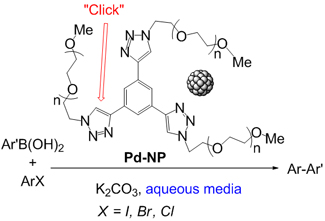Water-soluble palladium nanoparticles used as a recyclable catalyst

The development of chemical processes with minimal environmental impact has become a major area of interest in the scientific community. The use of water as a solvent and the design of recyclable catalysts are some of the promising directions in this field. Among water-soluble catalysts, a great deal of attention has been focused on metal nanoparticles. Water-soluble Pd(0) nanoparticles are a promising class of catalysts in some organic processes, mainly in hydrogenation, oxidation and cross-coupling reactions for the formation of C-C bonds.
A wide range of stabilizers for the preparation of nanoparticles are known, in order to prevent their aggregation. Among them, polymers provide a stabilization by entrapment, both through their steric bulk and through the weak dative bonds between the nanoparticle surface and the heteroatoms present in the structure of the protective agent. In this context, our work has been focused on the use of polyethylene glycol (PEG)-tagged derivatives as stabilizing agents for metal nanoparticles. The PEG chains are commercially available in various molecular weights, are soluble in water and are insoluble in diethyl ether.
In this work, it has been synthesized a new PEG-tagged compound from tryalquine and PEG-supported azide via click cicloaddition. The resulting material bearing longer polyether chains has been successfully used as stabilizer for the preparation of water-soluble palladium nanoparticles. The newly prepared nanomaterial has displayed good activity as catalyst in the Suzuki cross-coupling in aqueous media, providing in general good to excellent yields in a coupling of a range of aryl and heteroaryl substrates with boronic acids. It should be noted that the recyclability of the catalyst for aryl iodides and bromides has been established, giving good isolated yields in successive runs.
References
"Water-soluble palladium nanoparticles: Click synthesis and application as recyclable catalyst in Suzuki Cross-Couplings in aqueous media". Nereida Mejias, Roser Pleixats, Alexandr Shafir, Mercedes Medio, Gregorio Asensio. Eur. J. Org. Chem. 2010, 5090-5099.


